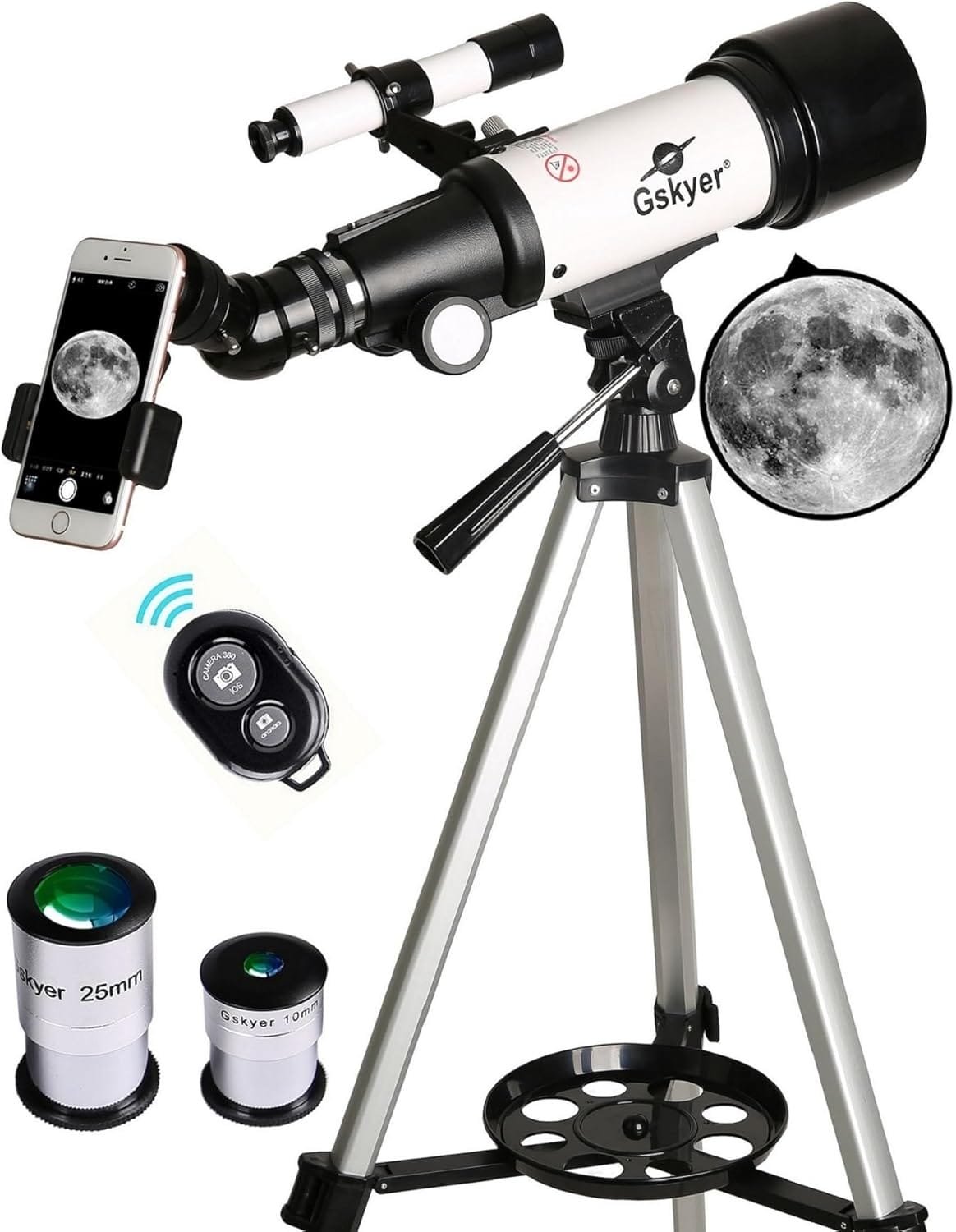Which is Better a Refractor or a Reflector Telescope – My Personal Experience
When I first started stargazing, I had no idea how much of a difference the type of telescope could make. After years of using both refractor and reflector telescopes, I’ve come to appreciate the unique strengths of each. The choice isn’t as simple as “one is better than the other”, it really depends on what you want to observe and how much effort you’re willing to put into maintenance. In this article, I’ll share my personal experiences to help guide you toward the right decision.
What is a Refractor Telescope?
A refractor telescope uses lenses to gather and focus light, and it was actually my first telescope. I remember being blown away by how sharp and crisp the images were when I looked at the moon and planets. In a refractor, the light passes through a large lens at the front, which bends (or refracts) the light to a point where the eyepiece magnifies the image.
Refractors are often what come to mind when people think of telescopes. They’ve been around for centuries—Galileo used a refractor for his groundbreaking observations. What struck me the most was how easy it was to use straight out of the box. No fiddling with mirrors, no extensive setup, just point it at the sky and start observing.
What is a Reflector Telescope?
After a couple of years with my refractor, I got curious about reflector telescopes, especially since they offered bigger apertures at a lower price. Unlike refractors, reflectors use mirrors instead of lenses. Light enters the open tube, hits a large concave mirror at the back, and reflects to a smaller mirror near the front, which directs the image into the eyepiece.
When I first used a reflector, I immediately noticed how much more light it could gather. Fainter objects, like distant galaxies and nebulae, really started to pop in a way my refractor couldn’t match. However, it wasn’t all smooth sailing there was definitely more maintenance involved, which I’ll touch on later.
Key Differences Between Refractor and Reflector Telescopes

Design and Optics
The first thing you’ll notice between the two is the design. Refractors are straightforward tubes with lenses, while reflectors have a more complex mirror setup. This difference in design leads to distinct optical characteristics.
- Refractors deliver sharp, high-contrast images, which I found ideal for viewing the moon and planets.
- Reflectors, with their larger apertures, are fantastic for deep-sky objects like nebulae and star clusters, but they require more maintenance to keep in top form.
How They Feel to Use
Refractors are typically easier to use and require almost no adjustment once set up, which is perfect for a beginner. Reflectors, on the other hand, require regular alignment (collimation) of the mirrors. I found this task a bit tedious at first, but once I got the hang of it, it became second nature.
Advantages of Refractor Telescopes
1. Crisp, Detailed Images
One of the things I loved about my refractor was how sharp the images were. Planets like Jupiter and Saturn appeared with clear, crisp detail. The lack of mirror alignment made the experience hassle-free—perfect for when I just wanted to pop outside for a quick stargazing session without much setup.
2. Minimal Upkeep
With refractors, you don’t have to worry about collimation or cleaning mirrors. The sealed tube design keeps dust and dirt out, and that was a big plus for me, especially living in a dusty area.

Gskyer 70mm Telescope for Adults & Kids – 400mm Portable Refractor with Travel Bag, Smartphone Adapter & Wireless Remote – High-Definition Astronomy for Beginners
The Gskyer 70mm Refractor offers a hassle-free, “set-it-and-forget-it” experience with crisp, high-contrast views of the Moon and planets. It is the ultimate portable kit for beginners, combining high-definition optics with a smartphone adapter and travel bag for instant stargazing anywhere.
Disadvantages of Refractor Telescopes
1. Chromatic Aberration
The one downside I noticed early on was chromatic aberration—those colored fringes that appear around bright objects, especially when using cheaper refractors. It wasn’t a deal-breaker for me, but if you’re a perfectionist, it might be a little annoying. High-end refractors can minimize this issue, but they’re quite expensive.

2. Price and Aperture Limitations
Speaking of expense, refractors can get pricey if you want a larger aperture. I found that beyond a certain point, you pay a lot more for a relatively small increase in light-gathering ability, which led me to explore reflectors.
Advantages of Reflector Telescopes
1. Affordable Large Apertures
When I switched to a reflector, the biggest advantage was clear: the price-to-aperture ratio is unbeatable. For the same budget, I was able to get a reflector with a much larger aperture, which allowed me to see fainter objects that my refractor just couldn’t pick up.
2. Great for Deep-Sky Observation
Reflectors excel at deep-sky observation. I’ll never forget the first time I saw the Andromeda Galaxy through my reflector. The amount of light it could gather was incredible. If deep-sky objects are what you’re after, reflectors are definitely the way to go.
Disadvantages of Reflector Telescopes
1. The Hassle of Maintenance (Collimation)
The trade-off with reflectors is that you’ll need to perform regular maintenance, specifically collimation. At first, I found it frustrating, but with practice, I got the hang of it. It’s something to be aware of, especially if you’re not mechanically inclined.
2. Size and Portability Concerns
Reflectors are often bulkier and harder to transport. I struggled a bit when I wanted to take my telescope to a dark-sky site, as packing and setting up the reflector took more effort. If portability is important to you, a refractor might be a better option.
A Side-by-Side Comparison
Refractor vs. Reflector: The Ultimate Technical Comparison
| Feature | Refractor Telescope (Lens-Based) | Reflector Telescope (Mirror-Based) |
| Optical System | Uses an Objective Lens to bend light. | Uses a Primary Mirror to reflect light. |
| Tube Environment | Sealed System: No internal air currents; optics stay pristine. | Open System: Subject to dust, moisture, and “tube currents.” |
| Image Contrast | Ultra-High: No central obstruction means the blackest backgrounds. | High to Moderate: Secondary mirror reduces some contrast. |
| Chromatic Aberration | Present: Visible color fringing in “Achromats”; corrected in “APOs.” | None: Mirrors reflect all wavelengths equally (Natural color). |
| Maintenance | Set-and-Forget: Lenses are factory-aligned for life. | Active Tuning: Requires regular “Collimation” (Mirror alignment). |
| Thermal Equilibrium | Rapid: Thin tubes cool down to match outside air in minutes. | Slow: Large glass mirrors can take 45–60 minutes to stabilize. |
| Light Gathering | Lower; limited by the high cost of making large glass. | Massive: Large “light buckets” reveal faint, distant galaxies. |
| Star Morphology | Pinpoint: Stars look like perfect, tiny white dots. | Diffraction Spikes: Bright stars show “cross” lines from the spider vanes. |
| Astrophotography | Best for Wide-Field: Preferred for crisp, high-resolution imaging. | Best for Deep-Sky: Ideal for faint targets; requires more setup. |
| Terrestrial Use | Multi-Purpose: Excellent for birding or ships (with a prism). | Sky-Only: Images are rotated or inverted (Upside down). |
| Portability | Small apertures are highly portable; large ones are very heavy. | Bulky but surprisingly light for their size (Truss-tube designs). |
| Cost per Inch | High: Professional glass casting is labor-intensive. | Low: Most aperture for the dollar (Dobsonian design). |
| Best For | Lunar, Planetary, and Double Star splitters. | Faint Galaxies, Nebulae, and Star Clusters. |
Which Telescope is Best for Beginners?
If you’re just starting out, I would recommend a refractor. They’re incredibly easy to use, require little to no maintenance, and deliver stunning views of planets and the moon. A refractor was my first telescope, and it really helped me get hooked on astronomy without overwhelming me with technical details.
Which Telescope is Better for Planetary Observation?
From my experience, refractors are the best for planetary observation. The sharpness and contrast I got when viewing planets like Mars and Saturn were outstanding. For anyone focused on our solar system, a refractor is hard to beat.
Which Telescope is Better for Deep-Sky Observation?
For deep-sky viewing, though, I’d go with a reflector. Its larger aperture allows you to see more distant and fainter objects like galaxies, nebulae, and star clusters. Some of my most memorable nights under the stars were with my reflector, peering into the depths of space.
Portability and Ease of Use Comparison
In terms of portability, refractors definitely win. They’re smaller, lighter, and quicker to set up. Reflectors, while offering more light-gathering power, can be cumbersome to transport, especially if you’re working with a larger model.
Cost Considerations
Reflectors give you more bang for your buck in terms of aperture size. However, if your focus is on ease of use and planetary observation, a smaller refractor is still worth the investment, even if it costs a bit more per inch of aperture.
Maintenance and Durability
In my experience, refractors are more durable and less demanding when it comes to maintenance. Reflectors require regular cleaning and collimation, and while I’ve come to accept it as part of the process, it’s something to consider if you want a low-maintenance option.
In my personal experience, a refractor telescope is better for planetary and lunar viewing, offering sharp, clear images with minimal maintenance. On the other hand, a reflector telescope excels at deep-sky observation, including galaxies and nebulae, thanks to its larger aperture and affordability. Each type of telescope has strengths and weaknesses depending on the observer’s needs and viewing preferences, making the choice between them dependent on what you want to observe and your budget.
Conclusion
So, which is better a refractor or a reflector telescope? From my personal experience, both have their place, and the right choice really depends on your interests. If you’re primarily interested in planetary observation and ease of use, I’d suggest starting with a refractor. But if you’re drawn to deep-sky objects and want the best value in terms of aperture size, a reflector is the way to go.
Whichever you choose, both types of telescopes have opened up the night sky for me in ways I never imagined, and I’m sure they will do the same for you.
faqs
What are the disadvantages of a reflecting telescope?
Reflecting telescopes can need frequent alignment and cleaning. Their open tube design also collects more dust and moisture over time.
Is a refractor or reflector telescope better for beginners?
Refractor telescopes are great for beginners—they’re simple to use and need little maintenance. Reflectors offer more power for the price but require more care.
Which is better for astrophotography: reflector or refractor telescope?
For deep-sky shots, reflector telescopes offer more light-gathering power. But for sharp, crisp planet images, a high-quality refractor works beautifully.
Refractor vs reflector telescope—how do you choose?
Choose a refractor for easy setup and clear views of the moon and planets. Pick a reflector for more aperture and better views of galaxies and nebulae.







